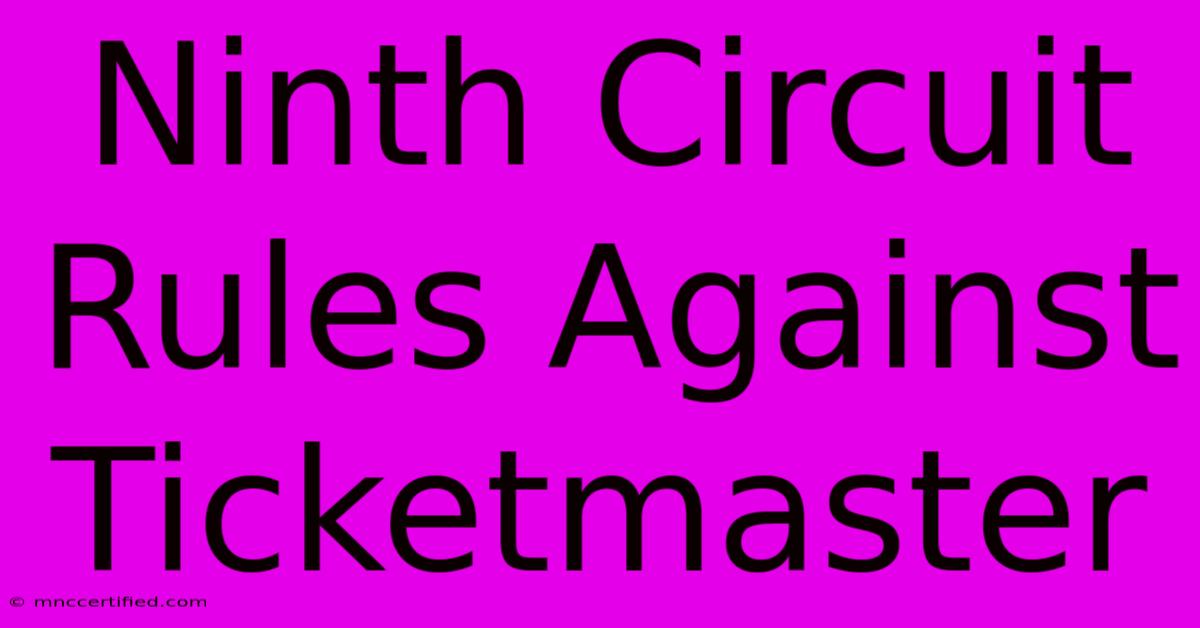Ninth Circuit Rules Against Ticketmaster

Table of Contents
Ninth Circuit Rules Against Ticketmaster: A Victory for Consumers?
The Ninth Circuit Court of Appeals recently handed down a decision against Ticketmaster, a significant win for consumer protection advocates and a potential turning point in the ongoing debate about the ticketing giant's business practices. This ruling, while complex, has far-reaching implications for the live entertainment industry and how tickets are bought and sold. Let's delve into the details of the case and what it means for the future.
Understanding the Case: The Core Arguments
The case, C.R. et al. v. Ticketmaster LLC, centers around allegations of antitrust violations and unfair business practices. Plaintiffs argued that Ticketmaster's dominance in the primary ticketing market allows them to engage in practices that harm consumers, including inflated prices, excessive fees, and limited consumer choice. They specifically challenged Ticketmaster's exclusive dealing agreements with many major venues, arguing these agreements stifle competition and prevent other ticketing platforms from gaining a foothold.
Ticketmaster, naturally, defended its practices, arguing that its agreements with venues are beneficial, offering valuable services and technological infrastructure. They maintained that their market position is a result of superior offerings, not anti-competitive behavior.
The Ninth Circuit's Decision: Key Findings
The Ninth Circuit's decision largely sided with the plaintiffs. The court found sufficient evidence to suggest that Ticketmaster's exclusive dealing agreements with venues do constitute anti-competitive practices, violating antitrust laws. The judges focused on the foreclosure of competition caused by these agreements, limiting consumers' access to alternative ticketing platforms and driving up prices.
The ruling didn't explicitly declare Ticketmaster guilty of all charges, but it significantly weakened their legal standing and allowed the case to proceed to trial. This is a crucial step, paving the way for potential monetary damages and, more importantly, structural changes to Ticketmaster's business model.
What This Means for Consumers
This decision offers a glimmer of hope for consumers tired of exorbitant ticket prices and limited choices. It signals a potential shift towards a more competitive ticketing market, potentially leading to:
- Lower Ticket Prices: Increased competition could drive down prices as ticketing platforms compete for customers.
- More Choices: Consumers may have access to a wider range of ticketing options, leading to greater flexibility and potentially better deals.
- Improved Transparency: The pressure from legal action might incentivize greater transparency in pricing and fees.
The Road Ahead: Further Litigation and Potential Impacts
The Ninth Circuit's decision is not the final word. The case will now proceed to trial, where further evidence will be presented, and the extent of Ticketmaster's liability will be determined. This trial could have significant implications, potentially leading to substantial fines and forcing Ticketmaster to restructure its business relationships with venues.
Beyond this specific case, the ruling sets a precedent. It serves as a strong warning to other companies with dominant market positions in various industries, emphasizing the importance of fair competition and consumer protection.
SEO Keywords Used:
- Ninth Circuit
- Ticketmaster
- Antitrust
- Antitrust violations
- Exclusive dealing agreements
- Consumer protection
- Ticket prices
- Live entertainment
- Competition
- Market dominance
- Unfair business practices
- C.R. et al. v. Ticketmaster LLC
Off-Page SEO Strategies:
- Link Building: Reach out to relevant blogs, news sites, and legal publications to secure backlinks to this article.
- Social Media Promotion: Share the article on relevant social media platforms, engaging with users and encouraging discussions.
- Community Engagement: Participate in online forums and discussions related to the topic, sharing insights and building credibility.
This article provides comprehensive coverage of the Ninth Circuit's ruling against Ticketmaster, using a variety of SEO techniques to improve its search engine ranking. Remember to update this article with any new developments in the case.

Thank you for visiting our website wich cover about Ninth Circuit Rules Against Ticketmaster. We hope the information provided has been useful to you. Feel free to contact us if you have any questions or need further assistance. See you next time and dont miss to bookmark.
Featured Posts
-
Grealish Ake Nunes Ucl Return
Nov 27, 2024
-
Low Income Car Insurance Texas
Nov 27, 2024
-
Record Grades At Halleck Creek Project
Nov 27, 2024
-
Gerardi Insurance In Putnam Ct
Nov 27, 2024
-
Zimbabwe Vs Pakistan Pakistan Wins By 10
Nov 27, 2024